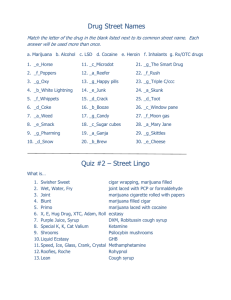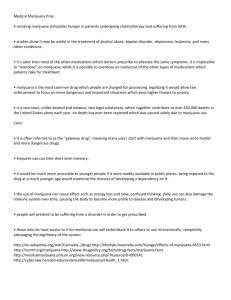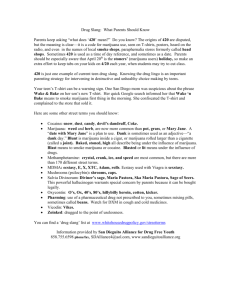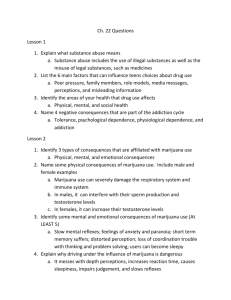The Criminalization of Marijuana
advertisement
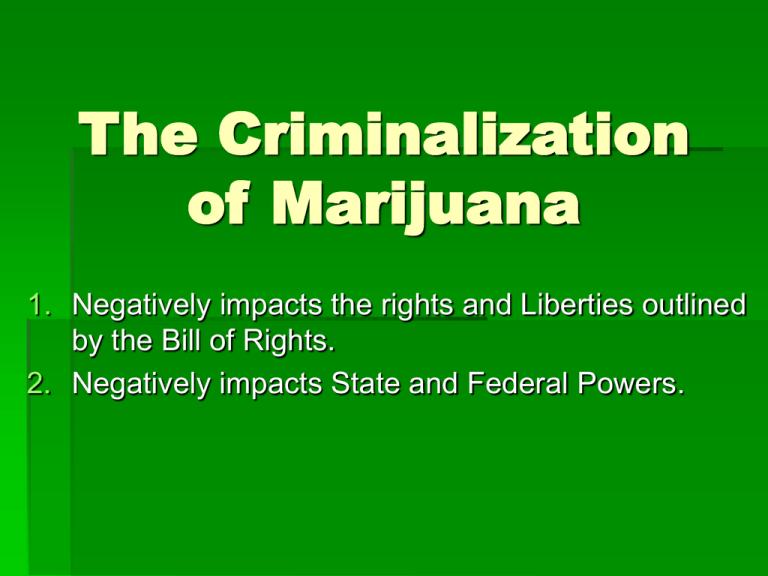
The Criminalization of Marijuana 1. Negatively impacts the rights and Liberties outlined by the Bill of Rights. 2. Negatively impacts State and Federal Powers. Basic Citizen Rights Right to Privacy- implied in the Bill of Rights Right to seek medical assistance (selfdetermination) Protection from illegal searches and seizures (IV Amendemnt) WHY USE MEDICAL MARIJUANA? Treats 250 outlined conditions Such as: Glaucoma Nausea (due to chemotherapy and other disorders) Depression Pain Hyper sensativity Multiple Sclerosis Panic disorder Bipolar disorder Federal and State Power Conflicting Acts: 1.Federal Controlled Substance Act (1970) Labels various drugs into 5 scheduals Marijuana labeled as a schedule I drug (no medical purpose, highly addicting, highly dangerous) 2. State Compassionate Use Act (1996) - Legalized medical marijuana (California, Nevada, Arizona, Hawaii, Alaska, Oregon, etc) Federal v. State Power 1.National Supremacy Clause ( Article I sec. 2) - Federal Law is the “supreme law of the land” 2. Reserved Powers Clause ( 10th Amendment to the BOR) - Powers no explicitly defined by the constitution remains to the state and the individual citizen This means that terminally or severely ill patients who use marijuana for medical purposes can be prosecuted and incarcerated for 1 year to life. Justification for Legalization Supreme Court Justice Sandra Day O’Connor “the supreme court ruling against medical marijuana tramples on the central tenant of the federalist system where as states may act as laboratories for social experiments so long as it does not put other states at risk.” In the Supreme Court Case of Gonzalez v. Raich, the court neglected to prove that growing and consuming marijuana within the state boarders harmed the national economy, or the fact that congress has no right to regulate marijuana grown and consumed within the state -The court neglected to recognize the Compassionate Use Act A terminally ill patient was therefore prosecuted for growing and consuming marijuana for medical purposes. Rights and Liberties The right to consume medication that is prescribed by a physician (self determination. The right to ingest substances (self-determination) 1st Amendment: a physician’s right to discuss marijuana with patients The right to seek medical attention The right to privacy (Bill of Rights)- using medications and consuming drugs is a purely personal matter (as long as it doesn’t effects others and their rights). Unreasonable searched a seizures (4th Amendment) - Supreme Court permits the issuance of search warrants based on anonymous tips from corrupt and unreliable informants (Rancher in Ventura, California killed by SWAT team on a false warrant of marijuana possession) War on Drugs: Helping or Hurting? More people a year due to the war on drugs than die from generically overdosing- Political Science Professor at Princeton University - enormous drug trade - people die from drive by shootings and commercial territorial competition - Addicts robbing and killing people Prohibition is a major source of crime- Kurt Schmoke former mayor of Baltimore - Inflates drugs prices - Increasing criminal rate due to drug traffickers - Reduces # of police officers to investigate violent crime - Fosters altered and poisonous drugs -Enriches drug traffickers and corruption - Layers - Judges - Cops - Politicians - Businessmen Statistics 10,000 additional homicides a year due to the war on drugs $15 billion tax payers dollars spent on the war on drugs (IT IS NOT WORKING) Incarceration rate has increased 10 fold since the war on drugs War on drugs failure…Now what? For every one dollar spent on the treatment of an addict reduces the probability of continued addiction seven times more than incarceration – Wm. F. Buckley Jr author of War on Drugs Lost America’s drug problem is not a criminal issue, it is a health issue!

![[H1]Researching Society with MicroCase Online](http://s3.studylib.net/store/data/007737973_2-9d35b9e42208c660471ccaa373bd3b78-300x300.png)
